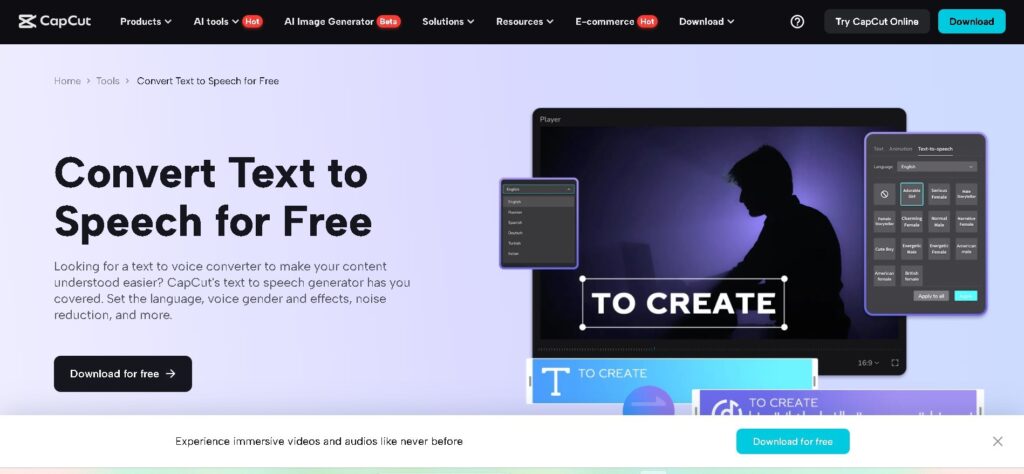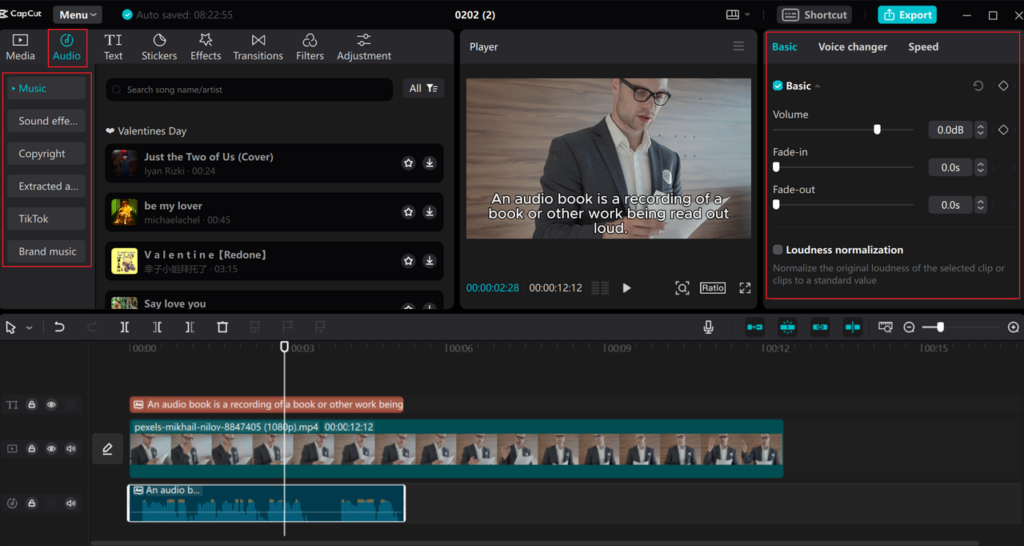
The Future of Text-to-Speech: Transforming Communication in Healthcare
Technology is changing every part of our lives, including healthcare. One of the latest advancements is text-to-speech (TTS) technology, which converts written words into spoken words. This innovation is already impacting many industries, and with CapCut Desktop Video Editor integrating TTS, healthcare is set to benefit in new and exciting ways.
CapCut is a popular free video editing software that allows users to create professional-looking videos. Recently, it has added TTS features, enabling users to turn text into natural-sounding speech. This development is significant for healthcare, where clear communication is essential. In this blog, we will explore how CapCut’s TTS can transform healthcare communication and the future of this technology.
How CapCut’s TTS Can Improve Healthcare Communication
-
Helping Patients with Disabilities
Many patients have speech impairments or conditions that make communication difficult. CapCut’s Text-to-speech AI can give them a voice by allowing them to type out their thoughts and have them spoken aloud. This can be life-changing for patients with conditions such as ALS, cerebral palsy, or stroke-related speech difficulties.
-
Enhancing Medical Training Videos
Medical professionals often use videos for training and education. With CapCut’s TTS, institutions can create high-quality voiceovers quickly and efficiently. This makes it easier to update training materials and provide accurate information to medical students and professionals worldwide.
-
Improving Doctor-Patient Communication
Language barriers can be a challenge in healthcare. A doctor might not speak the same language as a patient, which can lead to misunderstandings. CapCut’s TTS and translation tools can help bridge this gap by converting text into different languages and ensuring patients understand their diagnosis and treatment options.
-
Creating Informational Videos for Patients
Hospitals and clinics often must provide patients with information about treatments, medications, and procedures. Instead of relying solely on printed brochures, healthcare providers can use CapCut’s TTS to create engaging, easy-to-understand videos that explain medical concepts clearly and friendly.
-
Reducing the Workload for Healthcare Professionals
Doctors and nurses are often overwhelmed with administrative work. CapCut’s TTS can help by converting written reports, instructions, or guidelines into spoken audio. This can save time and allow healthcare professionals to focus more on patient care.
How to use text-to-speech on CapCut
CapCut’s AI Text-to-Speech (TTS) feature lets you turn text into natural-sounding voiceovers with various tones and styles. Here’s how to do it:
Step 1: Upload Video
Open CapCut and create a new project. Import your video or start with a blank canvas. Click on the “Text” tool and type your script.
Step 2: Convert Text to Speech
Select the “Text-to-Speech” option. Choose a voice style (e.g., male, female, energetic, robotic).
Adjust speed, pitch, and emphasis for the best effect. Click “Generate” to create the voiceover.
Step 3: Export
Preview the voiceover and make edits if needed. Add background music or subtitles for a polished look. Click “Export” and save your video in high quality.
The Future of CapCut’s TTS in Healthcare
-
More Natural-Sounding Voices
As artificial intelligence (AI) improves, AI Video Generator become more realistic. In the future, CapCut’s TTS may offer voices that sound just like real humans, with emotional tones and better pronunciation. This will make healthcare videos and patient communication even more effective.
-
Integration with AI Assistants
AI-powered assistants are already helping doctors diagnose illnesses and manage patient records. If CapCut’s TTS integrates with AI assistants, healthcare professionals could use voice technology to receive real-time updates, reminders, and instructions while treating patients.
-
Custom Voices for Healthcare Professionals
Future versions of CapCut’s TTS might allow doctors to create custom voice models. This means a doctor’s voice could be used in patient information videos, making the experience more personal and trustworthy for patients.
-
Real-Time Speech Translation
Global healthcare services often face language barriers. In the future, CapCut’s TTS might include real-time translation, allowing doctors and patients to communicate instantly, even if they don’t speak the same language. This could revolutionize emergency medical care in international settings.
-
Accessibility for Visually Impaired Patients
Accessing medical information can be challenging for patients with visual impairments. CapCut’s TTS can create audio versions of important healthcare documents, making it easier for visually impaired individuals to receive the needed information.
Challenges and Considerations
While CapCut’s TTS has excellent potential, some challenges must be addressed.
-
Accuracy and Pronunciation Issues
Medical terms can be complex and difficult to pronounce correctly. To ensure accurate pronunciation, CapCut will need to improve its TTS system.
-
Privacy and Security Concerns
Healthcare information is sensitive. If CapCut’s TTS is used in hospitals, strict privacy measures must be in place to protect patient data and ensure compliance with healthcare regulations.
-
Adoption by Healthcare Professionals
Not all medical professionals may be comfortable using new technology. Training and education will be necessary to encourage healthcare providers to adopt CapCut’s TTS in their daily work.
Conclusion
The future of CapCut’s TTS in healthcare is promising. From improving communication for patients with disabilities to enhancing medical training and breaking language barriers, this technology can revolutionize healthcare communication. As AI and TTS continue to improve, we can expect even more significant advancements in the future.
With the right improvements and considerations, CapCut’s TTS could become a valuable tool in hospitals, clinics, and medical training institutions worldwide. By embracing this technology, healthcare professionals can provide better care, improve patient outcomes, and make medical information accessible to everyone.
As we move forward, it will be exciting to see how CapCut’s TTS evolves and continues to transform the healthcare industry. Whether through real-time translation, custom voices, or AI integration, the future looks bright for medical text-to-speech technology.
Author Profile

- Blogger by Passion | Contributor to many Business and Marketing Blogs in the United Kingdom | Fascinated with SEO and digital marketing and latest tech innovations |
Latest entries
 Digital MarketingApril 11, 2025Digital Marketing Tactics That Generated £1M in Revenue for UK Retailers
Digital MarketingApril 11, 2025Digital Marketing Tactics That Generated £1M in Revenue for UK Retailers Web DesignApril 11, 2025UK Digital Trends: Top Website Building Solutions for 2025
Web DesignApril 11, 2025UK Digital Trends: Top Website Building Solutions for 2025 TechnologyMarch 31, 2025The Future of Text-to-Speech: Transforming Communication in Healthcare
TechnologyMarch 31, 2025The Future of Text-to-Speech: Transforming Communication in Healthcare TechnologyMarch 28, 2025Top-Rated Tools Every Modern Recruiter Needs in Their Toolkit
TechnologyMarch 28, 2025Top-Rated Tools Every Modern Recruiter Needs in Their Toolkit



